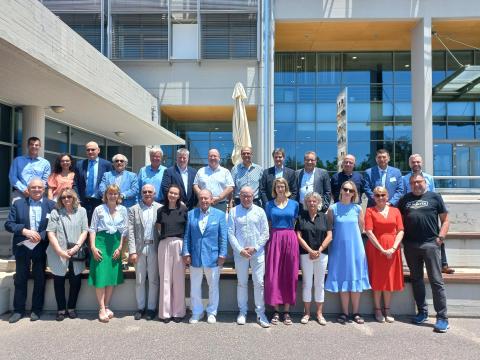European Economic
and Social Committee
All Hands-On-Deck for the Skills Revolution
Over 20 members of the EESC Labour Market Observatory (LMO), including Carlos Trindade, LMO President, Baiba Miltoviča, President of EESC's TEN section (Transport, Energy, Infrastructure, and the Information Society), and Michael McLoughlin, President of the EESC ad hoc group on the European Year of Skills, convened at Cedefop to address the present and future needs of skills and employment in Europe.
Front and centre of the discussion were the pressing issues of skills mismatch and job quality, the rise and role of artificial intelligence competency, and the multifaceted approach needed to address adult learning in today’s dynamic job market.
With 90 million EU citizens needing training for digital skills over the next decade, Jürgen Siebel, Executive Director of Cedefop, emphasized the urgent need for a system-wide approach to skills development, building on the momentum generated by the European Year of Skills.
"To make the digital and green transition an opportunity and a reality for all Europeans, we need to move from the skills policy drawing boards to massive implementation,” Mr Siebel remarked. “The real action needs to take place in sectors, regions, and cities all over Europe.“
Mr Trindade noted, “Cedefop’s research on AI, looking at job design and AI skills in the workplace, shows the importance of bringing an AI lens in our tripartite ecosystem, because AI impacts workers, employers, and the job market. Digital skills and AI competency are opportunities for workers and businesses to stay innovative and competitive."
He also informed that the EESC's Section for Employment, Social Affairs and Citizenship was preparing two opinions on artificial intelligence, one of which was looking at the rights of workers, given that "AI is becoming a prominent feature in many people's jobs." "Artificial intelligence transforms jobs and functions. The tasks of all workers, at all levels of skills, are changing", added Lech Pilawski, LMO Vice-President.
Voicing the concerns of the EESC's Section for Transport, Energy, Infrastructure, and the Information Society, Baiba Miltoviča emphasized the need to find stronger synergies between Vocational Education and Training (VET) and industries, ensuring convergence in the skills being developed and market needs and expectations. The gap in gender balance, with women less represented in technical jobs, is also an obstacle to Europe’s growth, and requires immediate action from all parties shaping tomorrow’s jobs.
The meeting was an opportunity for the Labour Market Observatory and Cedefop to take the pulse on progress on the skills and learning agenda in Europe, showcasing the multifaceted reality of moving from policy to implementation.
